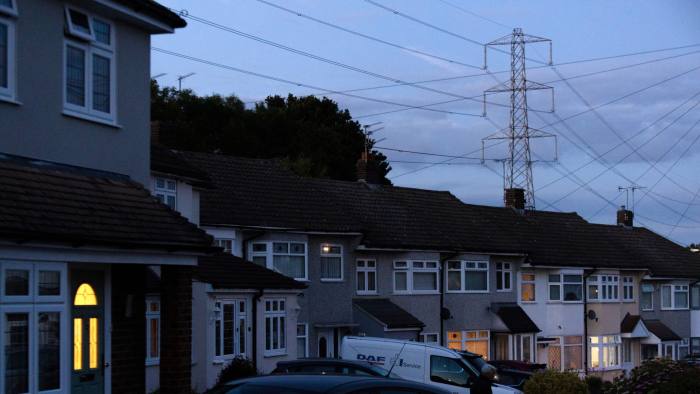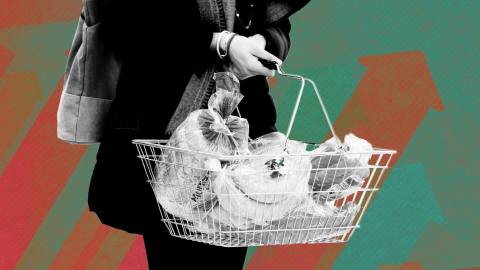UK inflation hits fresh 40-year high of 9.4% and ‘could hit 12% in October’
The prospect of inflation hitting 12% this autumn is looming larger after dearer fuel and food pushed the official measure of the cost of living to a fresh 40-year high.
A one-month increase in petrol prices not seen since at least the late 1980s, coupled with across the board increases in food staples such as eggs, milk, cheese and vegetables sent Britain’s annual inflation rate up from 9.1% to 9.4% in June.
With the annual energy price cap predicted to rise from just under £2,000 to more than £3,000 in October, analysts warned there was worse to come.
Paul Dales, chief UK economist at Capital Economics said there was some sign global price pressures were being replaced by higher domestically generated inflation.
“We still think inflation will rise to 12% in October and that interest rates will be raised from 1.25% to 3%, although it’s finely balanced whether they rise by 25bps or 50bps in August,” Dales said.
The Bank of England said last month it expected the annual inflation rate, which stood at 2.5% in June 2021 and has risen for nine months in a row, to peak at just over 11% in the autumn before falling sharply next year.
The City had been forecasting inflation would pick up to 9.3% after the price of unleaded petrol rose by about 20p a litre in June. Markets are expecting the Bank to respond to the highest inflation since 1982 by raising interest rates by either 0.25 or 0.5 percentage points next month. Andrew Bailey, the Bank’s governor said both would be on the table at the August meeting of its monetary policy committee.
Prices rose by 0.8% between May and June – the highest June increase since modern records began in 1988 – compared with a 0.5% jump in the same month a year earlier.
The ONS chief economist, Grant Fitzner, said: “Annual inflation again rose to stand at its highest rate for over 40 years. The increase was driven by rising fuel and food prices; these were only slightly offset by falling secondhand car prices.”
The UK’s statistical agency said the cost of motor fuels had risen by more than 42% in the year to June, with petrol and diesel hitting new highs last month. More expensive fuel was only partly offset by a drop in the price of secondhand cars.
Food was the other big factor behind the inflation rate rise, with particularly sharp increases in the cost of milk, eggs and cheese all contributing to a 1.2% increase between May and June and a 12-month rise of 9.8%.
The Resolution Foundation thinktank said the inflation rate for the poorest 10% of households was already running at 10.6% because they spent a higher proportion of their incomes on food and energy.
TUC general secretary Frances O’Grady said: “Families are under immense pressure as food and energy costs soar, and companies raise prices much faster than wages.”
UK inflation rises to highest level in almost 30 years at 5.4%
Re: UK inflation rises to highest level in almost 30 years at 5.4%
-

dutchman - Site Admin
- Posts: 57788
- Joined: Fri Oct 23, 2009 12:24 am
- Location: Spon End
Re: UK inflation rises to highest level in almost 30 years at 5.4%
Maybe they'd like to mention that the chancellor cost us untold amounts with his covid printing of money, or that we are currently printing money to prop up Ukraine?
As usual, the MSM are telling half a story, the half that suits them!
As usual, the MSM are telling half a story, the half that suits them!
Of course it'll fit; you just need a bigger hammer.
-

rebbonk - Posts: 72500
- Joined: Thu Nov 12, 2009 6:01 am
Re: UK inflation rises to highest level in almost 30 years at 5.4%
Food costs push price rises to new 40-year high
Soaring food costs have pushed UK inflation into double digits for the first time since 1982, with prices continuing to rise at their fastest rate for more than 40 years.
Inflation hit 10.1% in the 12 months to July, up from 9.4% in June, the Office for National Statistics (ONS) said.
Soaring living costs are eating into household budgets, with prices rising faster than wages.
The Bank of England has said inflation could peak at more than 13% this year.
Energy, petrol and diesel costs are also contributing to inflation. But food and non-alcoholic drinks were the largest contributor to rising prices in July, according to the ONS.
The price of bread, cereals, milk, cheese and eggs rose the fastest, while the cost of vegetables, meat and chocolate were also higher.
Prices also rose for other staples, such as toilet rolls, pet food and toothbrushes.
Transport costs were another big contributing factor, with air fares and international rail tickets particularly increasing. The price for package holidays also went up, as demand increased.
The rise in global food commodity prices, following Russia's invasion of Ukraine, has been one of the factors pushing up prices at supermarket tills.
The war has disrupted supplies from the two countries, which are major exporters of goods such as sunflower oil and wheat.
Some commodities, especially grain and edible oils, have eased substantially, but there is typically a time lag of around six months before that feeds through to prices on the shelves.
Kien Tan, director of retail strategy at PwC, said: "Supermarkets have had little choice but to pass on price increases from suppliers, themselves contending with unprecedented inflation in raw material and ingredient input costs.
"This has been particularly acute in labour and utility intensive categories like dairy, with reports of the price of a pint of milk having more than doubled in some stores since the start of the year."

-

dutchman - Site Admin
- Posts: 57788
- Joined: Fri Oct 23, 2009 12:24 am
- Location: Spon End
Re: UK inflation rises to highest level in almost 30 years at 5.4%
10%? Who do they think they are kidding? I'll bet the true rate is nearer 20%.
Of course it'll fit; you just need a bigger hammer.
-

rebbonk - Posts: 72500
- Joined: Thu Nov 12, 2009 6:01 am
Re: UK inflation rises to highest level in almost 30 years at 5.4%
It's almost exactly 20% if measured using the same system as in 1980.
They're a little out-of-date as the quayside price of fish just DOUBLED as anyone who bought some recently can tell you. Some of it due to unusual seasonal factors though.
The price of bread, cereals, milk, cheese and eggs rose the fastest, while the cost of vegetables, meat and chocolate were also higher.
They're a little out-of-date as the quayside price of fish just DOUBLED as anyone who bought some recently can tell you. Some of it due to unusual seasonal factors though.
-

dutchman - Site Admin
- Posts: 57788
- Joined: Fri Oct 23, 2009 12:24 am
- Location: Spon End
Re: UK inflation rises to highest level in almost 30 years at 5.4%
UK inflation to hit 18.6% next year according to Citigroup
UK inflation is on course to hit 18.6 per cent in January — the highest peak in almost half a century — because of soaring wholesale gas prices, according to a new forecast from Citigroup based on the latest market prices.
The investment bank predicted that the country’s retail energy price cap — which limits how much households pay for heating and electricity — would be raised to £4,567 in January and then £5,816 in April, compared with the current level of £1,971 a year. It added that the shifts would lead to inflation “entering the stratosphere”.
“We now expect CPI inflation to peak at over 18 per cent in January,” said Benjamin Nabarro, chief UK economist at Citi. That would be higher than the peak of inflation after the second Opec oil shock of 1979 when CPI reached 17.8 per cent, according to estimates from the Office for National Statistics.
Such a rate of inflation would squeeze household incomes hard and further push the UK economy into recession, but Nabarro said the scale of the likely inflation would push the Bank of England to tighten monetary policy further.
UK and European wholesale natural gas prices are already trading at close to 10 times normal levels and other forecasters have also raised their inflation predictions.
Goldman Sachs and EY said they expected an inflation rate of at least 15 per cent around the start of next year and the Bank of England said this month that inflation would exceed 13 per cent towards the end of the year.
The energy regulator Ofgem will on Friday announce the energy price cap for the period between October and January, which most analysts expect to rise to more than £3,500 for a household with average usage of energy — an increase of 75 per cent on current levels.
Based on the latest wholesale costs, Citi expects a higher figure for the fourth quarter of £3,717 with forecasts for 2023 looking to be “substantially greater”.
Nabarro said Citi’s new forecasts had taken account of a 25 per cent increase in wholesale gas prices last week and a 7 per cent rise in wholesale electricity prices.
“Even with the economy softening, last week’s data reaffirmed the continued risk of pass through from headline inflation into wage and domestic price setting could accelerate,” he said.
-

dutchman - Site Admin
- Posts: 57788
- Joined: Fri Oct 23, 2009 12:24 am
- Location: Spon End
Re: UK inflation rises to highest level in almost 30 years at 5.4%
Falling petrol prices pushed Britain’s inflation rate back below 10% in August in the first easing of upward pressure on the cost of living in almost a year.
The consumer prices index – the government’s preferred measure of inflation – dipped from 10.1% in July to 9.9% last month, with cheaper motoring costs more than offsetting the impact of dearer food.
Despite the better-than-expected figure, the Bank of England is still expected to raise interest rates by 0.5 points when its monetary policy committee meets next week.
Inflation remains more than three times higher than the 3.2% recorded in August 2021 and almost five times higher than the official 2% target. Core inflation – which strips out fuel, food, alcohol and tobacco and is closely monitored by the MPC – rose from 6.2% to 6.3% last month.
Data from the Office for National Statistics (ONS) showed petrol prices dropping by more than 14p a litre in August as a fall in global oil prices was finally reflected in cheaper motoring costs. The annual inflation rate for motor fuels eased from 43.7% to 32.1% between July and August.
Food price inflation rose for a 13th successive month, hitting a fresh 14-year high of 13.1% in August, with marked increases in the cost of milk, cheese and eggs.
The ONS said the cost of food and non-alcoholic beverages had risen throughout 2022, and the 1.5% increase between July and August 2022 was the largest between the two months since 1995.
Clothing and footwear prices rose by 1.1% between July and August as summer sales ended, compared with a 0.2% rise last year, pushing up the annual inflation rate from 6.6% to 7.6%
Further increases in the annual inflation rate are expected in the coming months as households are hit by rising domestic energy bills but the capping of the average annual bill at £2,500 will mean the peak is now expected to be lower, at about 11%.
Separate ONS figures for producer prices – which are a guide to inflationary pressure in the pipeline – showed some signs of easing. Fuel and raw material costs rose by 20.5% in the year to August, down from 22.6% in the year to July, while the cost of goods leaving factory gates was up by 16.1% in the year to August compared with 17.1% in the year to July.
The general secretary of the union Unite, Sharon Graham, said: “Rocketing inflation may have been eased last month but that won’t last. Current levels continue to threaten the living standards of millions of workers.”
Paul Dales, the chief UK economist at Capital Economics, said: “With the oil price now just above $90 a barrel, fuel prices will fall further in the coming months. And after the 25% month-on-month rise in utility prices on 1 October (as the Ofgem price cap increases to £2,500), which will add 0.7 percentage points to CPI inflation and drive it to a peak of about 11%, the government price freeze means that utility price inflation will slump from 69.7% now to zero by October next year.”
-

dutchman - Site Admin
- Posts: 57788
- Joined: Fri Oct 23, 2009 12:24 am
- Location: Spon End
Re: UK inflation rises to highest level in almost 30 years at 5.4%
the first fall since September 2021
Which just happened to be the month they fixed the pensions increase!
-

dutchman - Site Admin
- Posts: 57788
- Joined: Fri Oct 23, 2009 12:24 am
- Location: Spon End
Re: UK inflation rises to highest level in almost 30 years at 5.4%
UK inflation hits 40-year high of 10.1%
Britain’s inflation rate rose to a 40-year high of 10.1 per cent in September, as soaring food costs more than offset price declines at petrol pumps.
The jump in inflation as measured by the consumer price index exceeded economists’ expectations, rising from 9.9 per cent in August. It was driven by the highest food price increases in decades.
At more than five times the Bank of England’s 2 per cent target, the double-digit rate will also add to pressure on the central bank for a large interest rate rise on November 3.
The September inflation figures are also particularly important because they are normally used for increasing benefits and pensions the following April.
After the figures were released on Wednesday, Prime Minister Liz Truss confirmed in the House of Commons that state pensions would rise in line with inflation, but made no similar commitment to non-pensioner benefits.
With food prices rising at a multi-decade high of 14.6 per cent, economists said poorer families would be hit hardest.
George Dibb, head of the Centre for Economic Justice at the IPPR think-tank, said the “steeper rise in essentials such as food and drink where prices are now rising at over 14 per cent . . . underlines the need for greater support for the most vulnerable households this winter over and above the energy price cap”.
The details of the inflation figures showed there was an increase in the core index as well as higher food prices.
The Institute for Fiscal Studies estimated that, with food and energy prices rising fastest, inflation for the lowest-income tenth of the population was 12 per cent compared with 9 per cent for the richest tenth.
The core rate, excluding energy, food, alcohol and tobacco, which is closely watched by economists for signals of longer-term inflationary pressures, rose from an annual rate of 6.3 per cent in August to 6.5 per cent in September.
The Office for National Statistics, which released the figures, said the overall consumer price index rose 0.5 per cent in September compared with August, a larger increase over the month than in 2021 when the index rose only 0.3 per cent.
-

dutchman - Site Admin
- Posts: 57788
- Joined: Fri Oct 23, 2009 12:24 am
- Location: Spon End
Re: UK inflation rises to highest level in almost 30 years at 5.4%
That figure DOESN'T include the latest rise in gas and electricity prices!
-

dutchman - Site Admin
- Posts: 57788
- Joined: Fri Oct 23, 2009 12:24 am
- Location: Spon End
Who is online
Users browsing this forum: No registered users and 11 guests
-
- Ads








